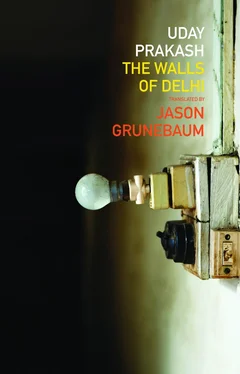Seven was the time Amar normally left home for school, and Shobha and Chandrakant spent an hour getting him ready. They were totally focused on Amar, who had begun to try getting out of going to school. While getting him ready they had no time to pay attention to Suri.
The Blue Bells school bus stopped right out front; the bus was packed with other schoolboys and girls. Sometimes Shobha, but mostly Chandrakant, would go out to put Amar on the bus. After he got on and said ‘ta ta’ and the bus pulled away they went back inside.
Every once in awhile Suri too tagged along to see Amar off, ambling far behind the others with his hunched shoulders bearing the load of his heavy, misshapen head. The boys and girls lit on Amar as he approached, giggling and calling out to him, waving and telling him to hurry up. Suri watched this silently, breaking into a happy smile. But then he felt that some of the kids and the girls in particular were looking at his weird head — the kids got a little scared, they began pointing at him and whispering things to each other, and this frightened Suri. After that, he didn’t come back for a few days and just stayed home. Then, after a little while, he would try again.
In the morning Shobha sometimes noticed Suri looking covetously at his brother when he was getting dressed for school, putting on his crisp, white, freshly washed shirt, blue shorts and red tie, with matching white socks and shiny black shoes. She was assailed by ugly thoughts. After all, Suri was not well. There was no question that he was not healthy or normal. What would happen if he did something to himself because he felt frustrated, or deprived? Or what if he got angry and jealous of his brother and went and did something stupid. It was true, though, that compared to Amar, Suri didn’t have much stuff. A couple of t-shirts, two pairs of shorts, a pair of sweatpants. And all cheap stuff at that. His shoes, too, were nothing special, just some dull grey no-name sneakers she had bought on the street. Every morning, Shobha nagged and nagged Amar to brush his teeth, and even had to squeeze the Colgate herself onto the toothbrush. Then there was Suri, who did everything on his own. He liked the cool minty taste and smell so much that one time he squeezed a little extra onto his brush; Shobha saw, and yelled at him. ‘Hey, do you think that’s candy? Easy does it!’
Suri froze. He never did it again. Then there was the time Amar had got ready for school and set off with Chandrakant, leaving Suri alone with her, and he said, ‘Mummy, you’re right to think the way that you do. Why waste good money for no reason buying clothes and shoes for someone whose life you don’t put any stock in? I think you should do something similar with that someone’s food. Who knows when he might die? Until then who knows if he’s properly digesting the food he eats?’
Shobha couldn’t believe what she heard. ‘Have you lost your mind again? Always thinking crazy thoughts?’ She ran her hand along Suri’s head. His eyes welled with tears. ‘Son, as far as life and death go, nobody knows when and where you go forwards or backwards. The doctors only gave you until two or two-and-a-half, but you’re still with us, thanks to the grace of Auliya and Vitthal. And look at your papa’s boss, Gulshan Arora, who said that after he turn one hundred and five, he would ride that morning train, loud and high into the sky. He didn’t even make it to eighty. He folded long before.’
Suri found this hysterical. ‘Mummy, if I live to be one hundred and five, can you imagine how big my head would be? And where would I live? And who would come to lift that head of mine?’
***
Amar didn’t go to school on Sundays. Suri stomped his feet like a little kid: he wanted to take Amar’s tiffin, packed with parathas, go to the park, and sit on a bench under the neem tree and eat them. For his outing, Shobha packed two parathas, potato curry, and two cookies. Suri also brought a water bottle along. The crisis began when Amar noticed his brother making off with his tiffin and his water bottle; weeping and wailing ensued. The brothers began pushing and shoving each other. Suri would have strangled Amar if Shobha hadn’t come swiftly to remove his hands from his throat. That day, Shobha saw a wildness in Suri’s eyes, as in a writhing, wounded animal that suddenly exhibits savagery.
Suri looked right at Shobha and said in a cold, unwavering voice, ‘I want a tiffin box of my own. And you, all you living people, will buy one for me. From now on, I won’t be eating lunch inside this house.’
From then on Suri took his lunch box and tottered down the steps.
***
The truth was, however, that these kinds of incidents were few and far between. Most of the time Suryakant was nothing but loving and affectionate with his younger brother, Amarkant. And after he started going to the Jupiter Network cyber café, he began bringing back toffees, magic pop ups, and chocolate bars for his brother; it turned out that the owner, Rohan Chawla, gave him money. Chandrakant told me that Rohan told him his son Suri had a ‘genius mind.’ He added that if he didn’t have any work to do at home, he could go spend time at the café, and he’d be happy to pay him seven or eight hundred a month. Suri was a quick learner on the computer, and picked up Photoshop, learned how to blog, and do some graphic design work. He started learning 3-D animation on his own, without help from others; Rahul Chawla was awestruck.
Suri helped Amar when he had homework. When he had drawing assignments, Suri would draw them or colour them in with crayons or coloured pencils so vividly that Amar inevitably got ‘very good’ or ‘excellent’ marks. But one time Shobha yelled at him, ‘If you do all of your brother’s work, what’s he gonna learn? Let him do his own work!’ Suri stopped what he was doing and stood up.
‘Mummy, I want you to know that the drawing of the little shack and tree and sunset I’ve just made is the last picture I’ll ever draw.’ He staggered over the balcony and quietly went outside.
Shobha took a deep breath.
***
There are two other important facts about Suryakant. One is that he began sleeping less and less. It may have been that he did what ever he could to put off going to sleep — reading, watching TV — since the headaches and breathing problems were at their worst after he got up. One good thing about the new place was that the TV was in the living room.
The other key fact was that Suri was studying English and learning fast. He began watching English-language channels and reading books and newspapers in English. Sometimes he called me and we had long talks; Rohan Chawla let him use the phone at Jupiter Networks as much as he wanted. Suri surfed the internet and did a lot of instant messaging.
He called me one day. ‘Uncle, I’ve got the idea that before Independence, it made more sense to study Hindi. Now it’s better to be able to speak English.’ He paused to think about what he just said. ‘When the English were here, it was English that made us into slaves. Now that the English are gone, it’s Hindi that’s turned us into slaves.’
This is how he talked. Another time he told me, ‘Uncle, there’s no such thing as the Third World. There are only two worlds, and both of them exist everywhere. In one live those who create injustice, and all the rest, the ones who have to put up with the injustice, live in the other.
Much later I found out that Suryakant had kept a diary. He wrote all sorts of stuff in both Hindi and English. It looks like he wrote down his thoughts in the notebook, or what he was reading. The notebook was pretty thick, and mostly filled up with, it can be surmised, what he read and thought.
He had lovely handwriting, in both English and Hindi. From page twenty-seven of his notebook:
Читать дальше










